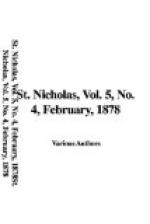“How glad the little children of Jerusalem must have been,” he thought, “that they sang to Jesus when they could. I suppose they never could again; for the next Friday He was dead. Oh, suppose He never let me sing to Him again!”
[Illustration: “‘Look at me,’ the old man said.”]
And tears and repressed sobs came fast at the thought, and he murmured aloud, thinking no one was near:
“Dear Savior, only let me sing once more here in church to you, and I will think of no one but you; not of the boys who laugh at me, nor the people who praise me, nor the Cistercians, nor the archduchess, nor even the dear choir-master, but only of you, of you, and perhaps of mother and Lenichen. I could not help that, and you would not mind it. You and they love me so much more than any one, and I love you really so much more than all besides. Only believe it, and try me once more.”
As he finished, in his earnestness, the child spoke quite loud, and from a dark corner in the shadow of a pillar suddenly arose a very old man in a black monk’s robe, with snow-white hair, and drew close to him, and laid his hand on his shoulder and said:
“Fear not, my son. I have a message for thee.”
At first, Gottlieb was much frightened, and then, when he heard the kind, tremulous old voice, and saw the lovely, tender smile on the wrinkled, pallid old face, he thought God must really have sent him an angel at last, though certainly not because he was good.
“Look around on these lofty arches, and clustered columns, and the long aisles, and the shrines of saints, and the carved wreaths of flowers and fruits, and the glorious altar! Are these wonderful to thee? Couldst thou have thought of them, or built them?”
“I could as easily have made the stars, or the forests!” said the child.
“Then look at me,” the old man said, with a gentle smile on his venerable face, “a poor worn-out old man, whom no one knows. This beautiful house was in my heart before a stone of it was reared. God put it in my heart. I planned it all. I remember this place a heap of poor cottages as small as thine, and now it is a glorious house of God. And I was what they called the master-builder. Yet no man knows me, or says, ‘Look at him!’ They look at the cathedral, God’s house; and that makes me glad in my inmost soul. I prayed that I might be nothing, and all the glory be His; and He has granted my prayer. And I am as little and as free in this house which I built as in His own forests, or under His own stars; for it is His only, as they are His. And I am nothing but His own little child, as thou art. And He has my hand and thine in His, and will not let us go.”
The child looked up, nearly certain now that it must be an angel. To have lived longer than the cathedral seemed like living when the morning stars were made, and all the angels shouted for joy.




